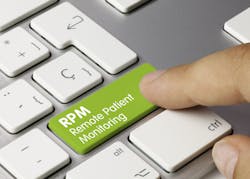Boston Hospital Leverages RPM Solution for Postpartum Hypertension
With a focus on postpartum hypertension, safety net hospital Boston Medical Center (BMC) has leveraged a remote monitoring platform to bring patient data from cellular-connected blood pressure cuffs into their clinical workflow.
Postpartum hypertension is a leading cause of postpartum hospital readmissions and severe maternal morbidity, as it can lead to heart attacks and strokes. Monitoring blood pressure at the doctor’s office post-pregnancy can also be difficult, due to barriers in accessing care, something that is a greater challenge for BMC’s diverse, safety-net population. To address this challenge, Boston Medical Center leveraged the Rimidi platform to bring remotely generated patient data from cellular-connected blood pressure cuffs into their clinical workflow. As part of Epic’s app orchard, Rimidi launches directly within the BMC team’s Epic work flow.
“As a safety net hospital, many of our patients are underinsured and have social determinants that impact their healthcare, and monitoring postpartum BP through in-person visits can be challenging due to barriers in care access,” said Christina Yarrington, M.D., director of labor and delivery and the division director for maternal fetal medicine at BMC, in a statement. “Leveraging Rimidi and the connected blood pressure cuffs, which run on local cellular networks, our program has been able to significantly increase the number of BP measurements taken in the six weeks following delivery, a crucial component to proactively preventing adverse outcomes like heart attack and stroke.”
Rimidi says that by bringing together clinical decision support, remote patient monitoring and patient reported outcomes in a unified, composable, FHIR-based platform, it supports a broad range of clinical use cases and institutional priorities across large and small healthcare organizations.
The company said its SMART on FHIR platform enables configurable clinical decision support cards and alerts to flag when a patient is missing a reading or when readings are outside a certain threshold. For this program, Rimidi created several alerts in coordination with BMC to improve triage, patient/provider communication, and the clinical workflow: High BP, Low BP, Missed Reading, and New Message. The BMC team receives a “Due for Discharge” alert when a patient has been monitored for six weeks to support workflow efficiencies. At that time, if the patient’s readings look good, the clinical team will collect their BP cuff to be sanitized and used for a new patient.
One way that Rimidi and BMC have analyzed the program’s success is looking at how often the clinical decision support cards are surfacing and how often clinicians are taking action on those cards. For example, over a six-month period, where a total of 505 unique patients were monitored for approximately six weeks each, there were:
• 8,922 total blood pressure readings
• 913 high blood pressure alerts
• 174 low blood pressure alerts
• 700 messages sent from the care team to patients, usually when there was a missing or concerning BP reading.
• 93 messages sent by patients to the care team, showing an efficient means of engagement.
The BMC team recently published an abstract in the American Heart Association Journal, Circulation, in which they examined engagement and hypertension prevalence and severity in eligible patients who delivered between April 2020 and September 2021. Out of the 1,000 patients monitored during that time period, 98.7 percent submitted at least one blood pressure measurement, with an average of 17 unique measurements from enrolled patients during the six weeks after delivery -- which has led to the early detection and management of stroke-risk blood pressure. With this, Boston Medical Center concluded that not only does remote monitoring improve ascertainment of their high-risk postpartum patient population, but they found similar patterns across different racial and ethnic groups, suggesting that remote patient monitoring could improve disparities for this patient population.
Based on this early success, BMC is now expanding the program to include monitoring for gestational hypertension, using cellular blood pressure cuffs and gestational diabetes, using cellular glucometers and FreeStyle Libre continuous glucose monitors In addition, the hepatology department at BMC has adopted Rimidi’s nonalcoholic fatty liver disease view to support a grant-funded program focused on developing efficient and effective care pathways between multidisciplinary providers in the screening, identification, referral and treatment of high-risk Non-Alcoholic Steatohepatitis patients.


